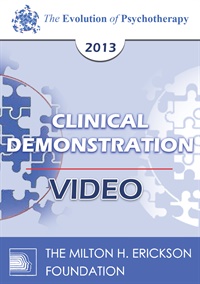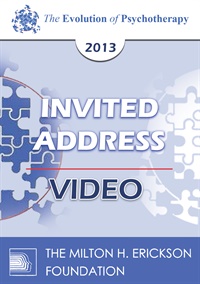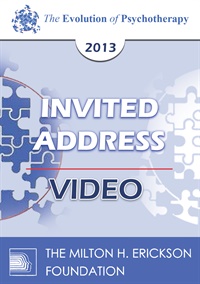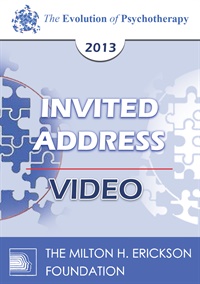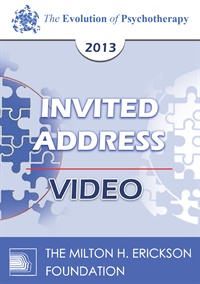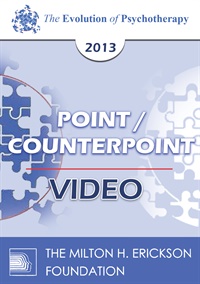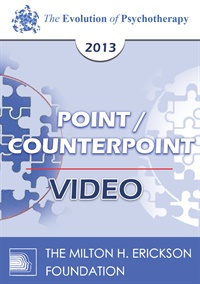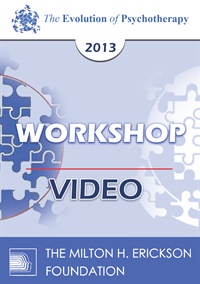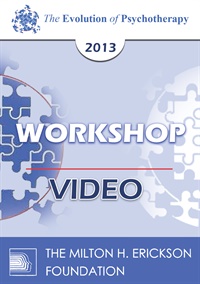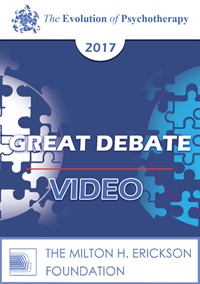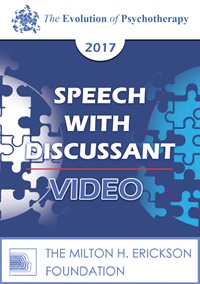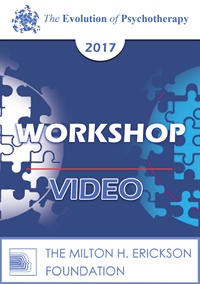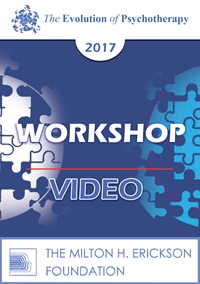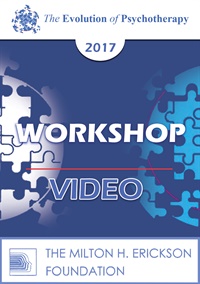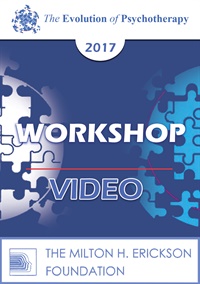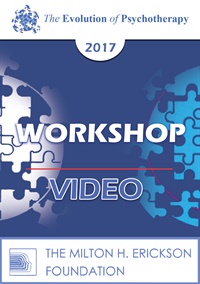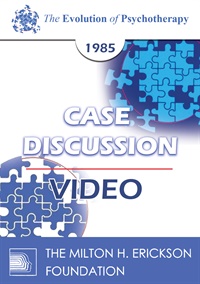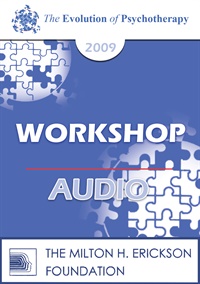
- Average Rating:
- Not yet rated
- Topic Areas:
- Trauma | Workshops | Psychotherapy
- Categories:
- Evolution of Psychotherapy | Evolution of Psychotherapy 2009
- Faculty:
- Bessel van der Kolk, MD
- Duration:
- 2 Hours 18 Minutes
- Format:
- Audio Only
- Original Program Date:
- Dec 12, 2009
- Short Description:
- The study of psychological trauma has been accompanied by an explosion of knowledge about how experience shapes the central nervous system and the formation of the self. We have learned that most experience is automatically processed on a subcortical level, i.e. by “unconscious” interpretations that take place outside of awareness. Insight and understanding have only a limited influence on the operation of theses subcortical processes. When addressing the problems of traumatized people who, in a myriad of ways, continue to react to current experience as a replay of the past, there is a need for therapeutic methods that do not depend exclusively on understanding and cognition. This workshop surveys current research on how people’s brains, minds and bodies respond to traumatic experiences, and will specifically address the use of affect modulation techniques, EMDR, yoga, theater, and neuro feedback in overcoming various aspects of the destabilization and disintegration caused by trauma.
- Price:
- $15.00 - Base Price
- Average Rating:
- Not yet rated
- Topic Areas:
- Clinical Demonstrations | Trauma | Psychotherapy | Somatic Experiences
- Categories:
- Evolution of Psychotherapy | Evolution of Psychotherapy 2013
- Faculty:
- Peter Levine, PhD
- Course Levels:
- Master Degree or Higher in Health-Related Field
- Duration:
- 55:46
- Format:
- Audio and Video
- Original Program Date:
- Dec 13, 2013
- Short Description:
- A demonstration of the Somatic Experiencing ® trauma therapy model, presented by its developer, Dr. Peter Levine.
- Price:
-
Sale is $29.00
price reduced from Base Price - $59.00
- Average Rating:
- Not yet rated
- Topic Areas:
- Trauma | Invited Addresses | Memory | Post-Traumatic Stress Disorder (PTSD) | Psychotherapy | Research
- Categories:
- Evolution of Psychotherapy | Evolution of Psychotherapy 2013
- Faculty:
- Bessel van der Kolk, MD
- Course Levels:
- Master Degree or Higher in Health-Related Field
- Duration:
- 52:44
- Format:
- Audio and Video
- Original Program Date:
- Dec 13, 2013
- Short Description:
- This workshop explores how trauma affects people’s rhythms within themselves and with their surroundings. Trauma changes the way the brain processes information and how the human organism engages with the world. Because of biological systems that are altered in a use-dependent manner traumatized people continue to react in myriad ways to current experience as a replay of the past.
- Price:
-
Sale is $29.00
price reduced from Base Price - $59.00
- Average Rating:
- Not yet rated
- Topic Areas:
- Invited Addresses | Social Issues | Psychotherapy | Trauma
- Categories:
- Evolution of Psychotherapy | Evolution of Psychotherapy 2013
- Faculty:
- Mary Pipher, PhD
- Course Levels:
- Master Degree or Higher in Health-Related Field
- Duration:
- 1:06:21
- Format:
- Audio and Video
- Original Program Date:
- Dec 14, 2013
- Short Description:
- We’ll explore the deluge tidal of information, including a great deal of traumatic information about the fate of Mother Earth, that all of us are confronted with daily. I’ll share the steps of a trauma-to-transcendence cycle that begins with awareness, leads to resilient coping, and then continues to a transcendent response. This cycle always involves action and creates hope.
- Price:
-
Sale is $29.00
price reduced from Base Price - $59.00
Tags: Trauma Social Issues Psychotherapy
- Average Rating:
- Not yet rated
- Topic Areas:
- Addiction | Trauma | Invited Addresses | Psychotherapy | Family Systems
- Categories:
- Evolution of Psychotherapy | Evolution of Psychotherapy 2013 | Pioneers in Couples and Family Therapy
- Faculty:
- Claudia Black, PhD
- Course Levels:
- Master Degree or Higher in Health-Related Field
- Duration:
- 1:02:07
- Format:
- Audio and Video
- Original Program Date:
- Dec 14, 2013
- Short Description:
- When people think of trauma they often think of acute dramatic situations, such as a natural disaster or acts of terrorism. Yet, the majority of people who experience trauma experience a more subtle and chronic form that exists within their own family. Beginning with a genogram, Claudia Black, Ph.D., will give a portrait of addiction in the family, offering an overlay of how adverse child experiences, emotional abandonment and blatant violence are all aspects of the trauma.
- Price:
-
Sale is $29.00
price reduced from Base Price - $59.00
- Average Rating:
- Not yet rated
- Topic Areas:
- Invited Addresses | Meditation, Spirituality and Yoga | Trauma | Psychotherapy
- Categories:
- Evolution of Psychotherapy | Evolution of Psychotherapy 2013
- Faculty:
- Peter Levine, PhD
- Course Levels:
- Master Degree or Higher in Health-Related Field
- Duration:
- 35:23
- Format:
- Audio and Video
- Original Program Date:
- Dec 14, 2013
- Short Description:
- In the treatment of the effects of trauma, its inherent relationship with spirituality provides a vital link in the therapeutic process. The understanding of a person’s felt, spiritual connection is central to the therapeutic process. If we are unable to access a person’s spirituality, we may find ourselves trapped, as therapists, in areas that are fraught with pitfalls and “tight corners.” The intimate association between trauma and spirituality suggests therapeutic avenues that support the authentic transformation of traumatic experiences. Through the use of didactic material- including brain research, experiential practice incorporating the bodily “felt-sense,” and video material, we will introduce Somatic Experiencing® as a way to reconnect with the deep self. The focus will be on developing practical tools to gracefully enhance the relationship between trauma and spirituality within the therapeutic experience.
- Price:
-
Sale is $29.00
price reduced from Base Price - $59.00
- Average Rating:
- Not yet rated
- Topic Areas:
- Trauma | Point/Counterpoint Sessions | Psychotherapy
- Categories:
- Evolution of Psychotherapy | Evolution of Psychotherapy 2013
- Faculty:
- Francine Shapiro, PhD | David Barlow, PhD | Betty Alice Erickson, MS, LPC, LMFT
- Course Levels:
- Master Degree or Higher in Health-Related Field
- Duration:
- 1:13:22
- Format:
- Audio and Video
- Original Program Date:
- Dec 11, 2013
- Short Description:
- It is important for therapists to fully evaluate the entire clinical picture when treating the trauma victim. This includes not only the overt symptoms directly associated with the traumatic event, but potential problems in relationships and deficits in sense of self. Ultimately, it is important to address and foster health of body, mind, emotion and spirit. Case examples, research and client videos will be used to illustrate the procedures and comprehensive treatment effects that foster personal and relational development.
- Price:
-
Sale is $29.00
price reduced from Base Price - $59.00
- Average Rating:
- Not yet rated
- Topic Areas:
- Trauma | Meditation, Spirituality and Yoga | Point/Counterpoint Sessions | Psychotherapy | Religion
- Categories:
- Evolution of Psychotherapy | Evolution of Psychotherapy 2013
- Faculty:
- Donald Meichenbaum, PhD | Kathryn Rossi, PhD | Erving Polster, PhD
- Course Levels:
- Master Degree or Higher in Health-Related Field
- Duration:
- 1:14:58
- Format:
- Audio and Video
- Original Program Date:
- Dec 14, 2013
- Short Description:
- The major way that people cope with trauma in North America is to use some form of religious or spiritual rituals and meaning-making activities . In this workshop , Dr. Meichenbaum will consider both the positive and negative modes of spiritual coping, ways to assess for client’s spirituality, and ways to integrate spiritually-based interventions into psychotherapy, where indicated.
- Price:
-
Sale is $29.00
price reduced from Base Price - $59.00
- Average Rating:
- Not yet rated
- Topic Areas:
- Workshops | Eye Movement Desensitization and Reprocessing (EMDR) | Trauma | Psychotherapy
- Categories:
- Evolution of Psychotherapy 2013 | Evolution of Psychotherapy
- Faculty:
- Francine Shapiro, PhD
- Course Levels:
- Master Degree or Higher in Health-Related Field
- Duration:
- 2:18:20
- Format:
- Audio and Video
- Original Program Date:
- Dec 12, 2013
- Short Description:
- EMDR therapy is widely recognized as an effective trauma treatment by organizations such as the World Health Organization and the Department of Defense. In addition, 20 randomized trials demonstrate the positive effects of the eye movement component. Unlike other empirically supported approaches, it is unnecessary for the client to describe the trauma memory in detail or do daily homework to achieve positive effects. This presentation will demonstrate the eight phases of EMDR treatment with both adults and children through discussion, exercises and client videotapes.
- Price:
-
Sale is $29.00
price reduced from Base Price - $59.00
- Average Rating:
- Not yet rated
- Topic Areas:
- Workshops | Trauma | Neuroscience | Psychotherapy
- Categories:
- Evolution of Psychotherapy 2013 | Evolution of Psychotherapy
- Faculty:
- Bessel van der Kolk, MD
- Course Levels:
- Master Degree or Higher in Health-Related Field
- Duration:
- 2:14:41
- Format:
- Audio and Video
- Original Program Date:
- Dec 14, 2013
- Short Description:
- We will examine how neuroscience research has elucidated how, in the course of development, children learn to regulate their arousal systems and to focus on what is most relevant. We then will examine how trauma, abuse and neglect derail these processes and affect brain development. Since traumatic imprints are stored in subcortical brain areas and are largely divorced from verbal recall, a central focus needs to be to the somatic experiencing of trauma-related sensations and affects.
- Price:
-
Sale is $29.00
price reduced from Base Price - $59.00
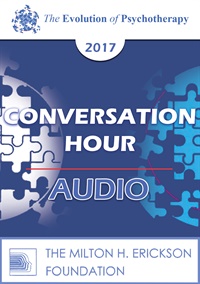
- Average Rating:
- Not yet rated
- Topic Areas:
- Conversation Hours | Post-Traumatic Stress Disorder (PTSD) | Trauma | Neuroscience | Psychotherapy
- Bundle(s):
- Learning Track - EP17 Trauma Download
- Categories:
- Evolution of Psychotherapy | Evolution of Psychotherapy 2017 | Evolution of Psychotherapy Trauma Learning Track
- Faculty:
- Bessel van der Kolk, MD
- Duration:
- 48:07
- Format:
- Audio Only
- Original Program Date:
- Dec 15, 2017
- Short Description:
- Attendees will learn about the fundamentals of trauma and the underlying neuroscience. Educational Objectives: Describe the common components of posttraumatic stress disorder. Describe three elements of the basic neuroscience of trauma.
- Price:
- $15.00 - Base Price
Credit available - Click Here for more information
- Average Rating:
- Not yet rated
- Topic Areas:
- Great Debates | Post-Traumatic Stress Disorder (PTSD) | Trauma | Neurobiology | Psychotherapy
- Bundle(s):
- Learning Track - EP17 Trauma Stream
- Categories:
- Evolution of Psychotherapy | Evolution of Psychotherapy 2017 | Evolution of Psychotherapy Trauma Learning Track | Online Continuing Education
- Faculty:
- Donald Meichenbaum, PhD | Bessel van der Kolk, MD
- Course Levels:
- Master Degree or Higher in Health-Related Field
- Duration:
- 1:19:12
- Format:
- Audio and Video
- Original Program Date:
- Dec 14, 2017
- Short Description:
- In the aftermath of traumatic and victimizing experiences, most individuals are impacted, but 75% evidence resilience while 25% “get stuck” and develop PTSD and co-occurring disorders. This presentation will discuss what distinguishes these two groups and considers the implications for treatment.
- Price:
-
Sale is $29.00
price reduced from Base Price - $59.00
Credit available - Click Here for more information
- Average Rating:
- Not yet rated
- Topic Areas:
- Speeches with Discussants | Trauma | Somatic Experiences | Memory | Continuing Education | Psychotherapy
- Bundle(s):
- Learning Track - EP17 Trauma Stream
- Categories:
- Evolution of Psychotherapy | Evolution of Psychotherapy 2017 | Evolution of Psychotherapy Trauma Learning Track | Online Continuing Education
- Faculty:
- Peter Levine, PhD | Bessel van der Kolk, MD
- Course Levels:
- Master Degree or Higher in Health-Related Field
- Duration:
- 1:23:22
- Format:
- Audio and Video
- Original Program Date:
- Dec 16, 2017
- Short Description:
- There is tremendous confusion in work with traumatic memories, often leaving clients and their therapists confused and insecure. In this lecture we will discuss the different types of memory (both explicit/conscious & implicit/unconscious) in resolving traumatic reactions, while avoiding the creation of "false memories."
- Price:
-
Sale is $29.00
price reduced from Base Price - $59.00

- Average Rating:
- Not yet rated
- Topic Areas:
- Post-Traumatic Stress Disorder (PTSD) | Topical Panels | Trauma | Psychotherapy
- Bundle(s):
- Learning Track - EP17 Trauma Download
- Categories:
- Evolution of Psychotherapy | Evolution of Psychotherapy 2017 | Evolution of Psychotherapy Trauma Learning Track
- Faculty:
- Peter Levine, PhD | Bill O'Hanlon, MS | Bessel van der Kolk, MD
- Duration:
- 1:00:15
- Format:
- Audio Only
- Original Program Date:
- Dec 15, 2017
- Short Description:
- Every therapist needs a method to work with posttraumatic stress disorder. Fundamental techniques will be discussed. Neurological considerations will be offered.
- Price:
- $15.00 - Base Price
Credit available - Click Here for more information
- Average Rating:
- Not yet rated
- Topic Areas:
- Workshops | Post-Traumatic Stress Disorder (PTSD) | Trauma | Future Oriented | Psychotherapy | Brief Therapy
- Bundle(s):
- Learning Track - EP17 Trauma Stream
- Categories:
- Evolution of Psychotherapy | Evolution of Psychotherapy 2017 | Evolution of Psychotherapy Trauma Learning Track | Online Continuing Education
- Faculty:
- Bill O'Hanlon, MS
- Course Levels:
- Master Degree or Higher in Health-Related Field
- Duration:
- 2:35:20
- Format:
- Audio and Video
- Original Program Date:
- Dec 13, 2017
- Short Description:
- This workshop will detail a philosophy and methods of working briefly and effectively with people who have been traumatized. An array of new methods has shown that previous conceptions and methods of working with trauma are unnecessarily long-term and re-traumatizing. These new approaches, rather than being based on the past and deterministic models, are oriented towards the present and future and a sense of possibilities.
- Price:
-
Sale is $29.00
price reduced from Base Price - $59.00
Credit available - Click Here for more information
- Average Rating:
- Not yet rated
- Topic Areas:
- Workshops | Post-Traumatic Stress Disorder (PTSD) | Couples Therapy | Gottman Method | Psychotherapy | Trauma
- Categories:
- Evolution of Psychotherapy | Evolution of Psychotherapy 2017 | Online Continuing Education
- Faculty:
- John Gottman, PhD | Julie Gottman, PhD
- Course Levels:
- Master Degree or Higher in Health-Related Field
- Duration:
- 2:23:26
- Format:
- Audio and Video
- Original Program Date:
- Dec 13, 2017
- Short Description:
- Couples therapy is made much more complex when one or both partners suffers from PTSD. This workshop will demonstrate with films and lecture how to apply Gottman Method Couple Therapy to the treatment of PTSD. Films include cases of both childhood and military trauma.
- Price:
-
Sale is $29.00
price reduced from Base Price - $59.00
Credit available - Click Here for more information
- Average Rating:
- Not yet rated
- Topic Areas:
- Workshops | Post-Traumatic Stress Disorder (PTSD) | Trauma | Mind-Body | Psychotherapy
- Bundle(s):
- Learning Track - EP17 Trauma Stream | Learning Track - Turn Down the Trauma
- Categories:
- Evolution of Psychotherapy | Evolution of Psychotherapy 2017 | Evolution of Psychotherapy Trauma Learning Track | Online Continuing Education
- Faculty:
- Peter Levine, PhD
- Course Levels:
- Master Degree or Higher in Health-Related Field
- Duration:
- 1:38:05
- Format:
- Audio and Video
- Original Program Date:
- Dec 13, 2017
- Short Description:
- EP17 Workshop 10 - In an Unspoken Voice: How the Body Released Trauma and Restores Goodness - Peter Levine, PhD Traditionally, therapies have attempted to change perceptions of the world by means of reason and insight, with conditioning and behavior modification, or with drugs and medications. The trauma response is a set of defensive bodily reactions that people initially mobilize in order to protect themselves, both from threat, and then later, against feeling the crushing totality of their horror, helplessness and pain. However, as time goes on, this avoidance keeps them frozen and stuck in the past, unable to be fully present, in the here and now, and unable to go forward in life. Fixed in the defensive trauma response, the shame, defeat and humiliation, associated with the original event replays itself over and over again in the body. Dr. Levine explores the implications of Body-oriented psychotherapy and recent findings in the neurosciences, on how the brain and body deals with e
- Price:
- $0.00 - $29.00
Credit available - Click Here for more information
- Average Rating:
- Not yet rated
- Topic Areas:
- Workshops | Post-Traumatic Stress Disorder (PTSD) | Trauma | Storytelling | Constructive Narrative | Addiction | Abuse | Borderline | Psychotherapy
- Bundle(s):
- Learning Track - EP17 Trauma Stream
- Categories:
- Evolution of Psychotherapy | Evolution of Psychotherapy 2017 | Evolution of Psychotherapy Trauma Learning Track | Online Continuing Education
- Faculty:
- Donald Meichenbaum, PhD
- Course Levels:
- Master Degree or Higher in Health-Related Field
- Duration:
- 2:48:12
- Format:
- Audio and Video
- Original Program Date:
- Dec 13, 2017
- Short Description:
- Ways to implement the core tasks of psychotherapy with patients who evidence PTSD and co-morbid disorders of prolong and complicated grief, Substance Abuse Disorders and Borderline Personality Disorders. A case conceptualization model of risk and protective factors and incorporates a constructive narrator perspective will be presented.
- Price:
-
Sale is $29.00
price reduced from Base Price - $59.00
Credit available - Click Here for more information
- Average Rating:
- Not yet rated
- Topic Areas:
- Workshops | Post-Traumatic Stress Disorder (PTSD) | Trauma | Psychotherapy
- Bundle(s):
- Learning Track - EP17 Trauma Stream
- Categories:
- Evolution of Psychotherapy | Evolution of Psychotherapy 2017 | Evolution of Psychotherapy Trauma Learning Track | Online Continuing Education
- Faculty:
- Bessel van der Kolk, MD
- Course Levels:
- Master Degree or Higher in Health-Related Field
- Duration:
- 2:17:19
- Format:
- Audio and Video
- Original Program Date:
- Dec 14, 2017
- Short Description:
- Trauma is a fact of life. Veterans and their families deal with the painful aftermath of combat; one in five Americans has been molested; one in four grew up with alcoholics; one in three couples have engaged in physical violence. Dr. Bessel van der Kolk, one of the world’s foremost experts on trauma, has spent over three decades working with survivors. He explores innovative treatments—from neurofeedback and meditation to sports, drama, and yoga—that offer new paths to recovery by activating the brain’s natural neuroplasticity.
- Price:
-
Sale is $29.00
price reduced from Base Price - $59.00

- Average Rating:
- Not yet rated
- Topic Areas:
- Neurobiology | Neuroscience | Great Conversations | Trauma | Post-Traumatic Stress Disorder (PTSD)
- Categories:
- Evolution of Psychotherapy | Evolution of Psychotherapy 2020
- Faculty:
- Donald Meichenbaum, PhD
- Course Levels:
- Master Degree or Higher in Health-Related Field
- Duration:
- 2 hours 8 minutes
- Format:
- Audio and Video
- Original Program Date:
- Dec 11, 2020
- Short Description:
- In the aftermath of experiencing traumatic and victimizing experiences, most individuals are impacted, but some 75% go onto evidence resilience, and in some instances Post Traumatic Growth. If the “body keeps score”, then what distinguishes the 75% resilient group from the 25% who develop PTSD and related disorders? This debate will address this question and the treatment implications for psychotherapeutic interventions.
- Price:
-
Sale is $29.00
price reduced from Base Price - $59.00
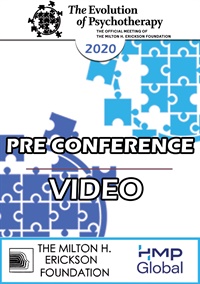
- Average Rating:
- Not yet rated
- Topic Areas:
- Post-Traumatic Stress Disorder (PTSD) | Trauma | Pre-Conference Sessions
- Categories:
- Evolution of Psychotherapy | Evolution of Psychotherapy 2020
- Faculty:
- Donald Meichenbaum, PhD
- Course Levels:
- Master Degree or Higher in Health-Related Field
- Duration:
- 6 hours
- Format:
- Audio and Video
- Original Program Date:
- Dec 08, 2020
- Short Description:
- In the aftermath of victimizing and traumatic events, most individuals are impacted, but some 75% will go onto evidence resilience, and in some instances Post-traumatic growth. This workshop will discuss the neurobiological and psycho-social factors that distinguish these two groups and consider the treatment implications. Following a discussion of the controversies and empirical status of various psychotherapeutic interventions, a Case Conceptualization Model that informs both assessment and treatment decision-making will be offered.
- Price:
-
Sale is $49.00
price reduced from Base Price - $99.00
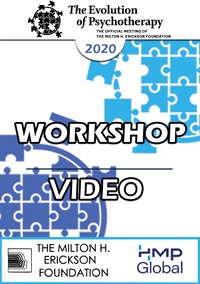
- Average Rating:
- Not yet rated
- Topic Areas:
- Trauma | Workshops | Art and Creativity | Social Psychology | Polyvagal Theory | Psychotherapy | Music | Psychology
- Categories:
- Evolution of Psychotherapy | Evolution of Psychotherapy 2020
- Faculty:
- Stephen Porges, PhD
- Course Levels:
- Master Degree or Higher in Health-Related Field
- Duration:
- 2 hours
- Format:
- Audio and Video
- Original Program Date:
- Dec 09, 2020
- Short Description:
- This presentation will focus on how Polyvagal Theory provides a plausible model to explain how and why intonation of voice and vocal music can support mental and physical health and enhance function during compromised states associated with illness, chronic stress, and trauma. The workshop will elaborate on the principles incorporated in the Safe and Sound Protocol™ and the lessons learned through preliminary clinical trials, current research, and feedback from clinicians applying the protocol to various clinical disorders including individuals with severe trauma histories.
- Price:
-
Sale is $29.00
price reduced from Base Price - $59.00
- Average Rating:
- Not yet rated
- Topic Areas:
- Case Discussions | Psychotherapy | Addiction | Trauma | Shame
- Categories:
- Evolution of Psychotherapy | Evolution of Psychotherapy 1985 | Pioneers in Couples and Family Therapy
- Faculty:
- Jay Haley, MA | Virginia Satir, MA, ACSW | Lewis R Wolberg, M.D. | Joseph Wolpe, M.D.
- Course Levels:
- Master Degree or Higher in Health-Related Field
- Duration:
- 58:18
- Format:
- Audio and Video
- Original Program Date:
- Dec 14, 1985
- Short Description:
- A case study featuring a married couple's therapeutic journey, highlighting the husband's sensitivity to criticism and the wife's analytical approach. Experts discuss potential interventions after seven months of counseling, including strategies for addressing communication barriers, uncovering underlying relationship dynamics, and potentially involving both families to resolve marital tensions. Moderated by Paul Karoly, PhD.
- Price:
-
Sale is $29.00
price reduced from Base Price - $59.00
- Average Rating:
- Not yet rated
- Topic Areas:
- Supervision Panels | Psychotherapy | Trauma
- Categories:
- Evolution of Psychotherapy | Evolution of Psychotherapy 1985 | Pioneers in Couples and Family Therapy
- Faculty:
- Mary Goulding, MSW | Ronald Laing, MD | Virginia Satir, MA, ACSW | Joseph Wolpe, M.D.
- Course Levels:
- Master Degree or Higher in Health-Related Field
- Duration:
- 51:53
- Format:
- Audio and Video
- Original Program Date:
- Dec 12, 1985
- Short Description:
- Distinguished therapists analyze complex therapeutic cases, offering nuanced strategies for addressing challenging client scenarios involving adolescent stealing, family dynamics, depression, PTSD, and relationship patterns. The panel provides insights into contract-based therapy, family systems approaches, and client-centered interventions across diverse psychological challenges. Moderated by Harold Arkowitz, PhD.
- Price:
-
Sale is $29.00
price reduced from Base Price - $59.00
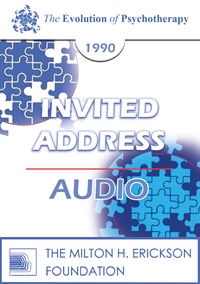
- Average Rating:
- Not yet rated
- Topic Areas:
- Invited Addresses | Trauma | Brief Therapy | Children and Adolescent Therapy | Psychotherapy | Redecision Therapy
- Categories:
- Evolution of Psychotherapy | Evolution of Psychotherapy 1990
- Faculty:
- Mary Goulding, MSW | Judd Marmor
- Duration:
- 1 Hour 26 Minutes
- Format:
- Audio Only
- Original Program Date:
- Dec 13, 1990
- Short Description:
- Today and in the immediate future, short-term therapy is a major available treatment for most clients. In this paper, I will discuss the use of Short-Term Redecision Therapy in the resolution of major childhood traumas, such as physical, sexual, and mental abuse. In Redecision Therapy, the client remembers, re-enacts, uses therapeutically, and then discards these early traumatic scenes.
- Price:
- $15.00 - Base Price


